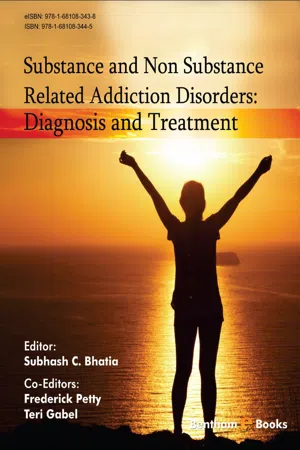
Substance and Non Substance Related Addiction Disorders: Diagnosis and Treatment
- English
- ePUB (mobile friendly)
- Available on iOS & Android
Substance and Non Substance Related Addiction Disorders: Diagnosis and Treatment
About This Book
Substance and Non substance Related Addiction Disorders: Diagnosis and Treatment is an accessible handbook with substance and non subsatance addiction disorders. It is divided into three sections which cover 1) general topics, the scientific underpinnings of addiction disorders (neurobiology, addiction neural reward pathways, genetic and psychosocial basis of addiction, drug screening and treatment of cooccuring psychaitric disorders), 2) information about substances commonly used by individuals with addiction (pharmacology, diagnostics and treatment considerations) and 3) current understandings of the diagnosis and treatment of behavioral addictions (such as gambling), respectively.
Key features:
-covers both substance and behavioral addictions
-uses a reader friendly format with a patient education handout style
-includes key learning points listed in each chapter
-includes clinical vignettes which outline brief history, evaluation, diagnostic considerations with successful pharmacological, psychological and social interventions
-includes references in each chapter
The handbook meets the information needs of medical students and professionals (family physicians, nurses, addiction therapists, psychiatry residents, and other health care professionals) interested in the care of patients afflicted with addiction disorders.
Frequently asked questions
Information
Pharmacologic Treatment for Psychiatric Disorders Associated with Substance Use Disorders: An Overview
Teri Gabel*
Abstract
* Corresponding author Teri Gabel: VA Nebraska Western Iowa Health Care System, Clinical Pharmacy Specialist - Mental Health, Omaha, NE 68105; Department of Psychiatry, University Of Nebraska College of Medicine Omaha NE 68198; Drug Therapy Consultants, PC 5116 N 116 St, Omaha NE 68164 USA; Tel: (402) 493-5222; Email: [email protected]
Key Learning Points
- Co-morbid psychiatric and medical diagnoses need to be adequately treated.
- Medications do not treat substance use disorders but manage associated symptoms.
- Effectively managing the symptoms of withdrawal and craving can improve outcomes.
- Medication choice must be carefully matched to the individual.
- Many medications are used off-label in the management of substance use disorders and their symptoms.
Introduction
Benzodiazepines (Table 1)
- Ongoing use of benzodiazepines in patients with substance use disorders should be avoided if possible. In situations of acute intoxication or withdrawal the use of benzodiazepines may be indicated for a short period of time.
- For acute use, lorazepam is generally the medication of choice. In some situations, a longer acting agent such as clonazepam, chlordiazepoxide or diazepam may be indicated. Choice is determined by reason for use, the required route of administration and the presence of active metabolites resulting in a longer duration of action.
| Agent | Equivalent Dose* | Pharmacokinetics/Pharmacology | Dosing Routes Available |
|---|---|---|---|
| Chlordiazepoxide | 25mg | Onset: Slow (45-60 min) Half-life: 24-96+ hours 4-5 active metabolites | Oral IM: absorption is erratic and use is not recommended |
| Clonazepam | 0.5mg | Onset: Intermediate (30 min) Half-life: 24 hours Insignificant active metabolites | Oral |
| Diazepam | 5mg | Onset: Rapid (15 min) Half-life: 20-89+ hours 2-3 Active metabolites | Oral IV (max rate 5mg/minute) IM: absorption is adequate in the deltoid only |
| Lorazepam | 1mg | Onset: Intermediate (30 min) Half-life: 12 hours NO active metabolites | Oral IV (max rate 2mg/minute) IM: good absorption anywhere |
Antidepressants
- Medication selection will depend on patient and medication variables. Patients with preexisting depression and/or anxiety should continue to be treated during treatment for addictive disorders. Depression and anxiety can also develop during treatment and as a side effect of medications such as naltrexone and acamprosate, and needs to be addressed.
- All antidepressants car...
Table of contents
- Welcome
- Table of Contents
- Title Page
- BENTHAM SCIENCE PUBLISHERS LTD.
- FOREWORD
- PREFACE
- List of Contributors
- Section I: General Topics
- Neurobiology and Psycho-Social Basis for Addiction and Related Disorders
- Urine Drug Screening (UDS) in the Management of Substance Use Disorders
- Genetics of Addiction
- Dual Diagnosis
- Pharmacologic Treatment for Psychiatric Disorders Associated with Substance Use Disorders: An Overview
- Motivational Interviewing
- Section II: Substance-Related Addiction Disorders (Alphabetical)
- Alcohol Use Disorders
- Anabolic-Androgenic Steroids (AAS) Related Disorders
- Caffeine Related Use Disorder
- Cannabis and Cannabinoid Use Disorders
- Ecstasy Substance Use Disorder
- Hallucinogen-LSD Use Disorder
- Inhalant Use Disorders
- Opioid Use and Addictive Disorder
- Phencyclidine (PCP) Use Disorder
- Sedative, Hypnotic or Anxiolytic-Related Disorders
- Stimulant Use and Addictive Disorder: Amphetamine, Cocaine and Other Stimulants
- Tobacco Use Disorders
- Section III : Non Substance-Related Addiction Disorders
- Non-Substance-Related Addictive Disorders
- Cognitive-Behavioral Therapy and Other Psychosocial Interventions for Substance Use Disorders